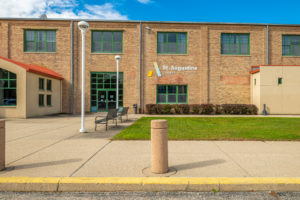Culinary Arts
On This Page
A.A.S. Culinary Arts
Our Associate of Applied Science with a Culinary Arts concentration is designed to give you the expertise needed to enter the food service or restaurant industry in a mid-level position. If you’ve ever envisioned yourself as a celebrated chef or envisioned the thrill of running your own restaurant or bakery, look no further. Our Associate Degree in Culinary Arts offers flexible and bilingual Culinary Arts courses for working professionals who want to get a degree while working at the same time.
In our Associates in Culinary Arts program, you won’t just learn the basics – you’ll master techniques, explore different cuisines, and develop creative menus that prepare you for the culinary world. Whether you aspire to lead in the kitchen or explore diverse avenues in the food industry, our curriculum is crafted to fuel your passion and guide you toward success. But that’s not all. Beyond traditional culinary education, we place a strong emphasis on hands-on kitchen experiences, coupled with a solid foundation in business principles. From mastering the core skills used by every chef to delivering excellent service, creating unforgettable guest experiences, and even building and running your own culinary business, our diverse courses in science, business, and hospitality empower you for a multifaceted career.
Located in the heart of Chicago, the hospitality hub of the world, our program offers more than just a degree; it provides you with valuable internship opportunities and future career growth. We believe in turning your passion into your purpose, and with the skills and experiences gained here, you’ll be equipped to make your mark in the culinary field.
Highlights of Our Associates in Culinary Arts Program
- Masterful Techniques: Learn classic and contemporary culinary skills to create diverse menus and excel in global cuisines.
- Hands-On Kitchen Experience: Refine your culinary skills under expert guidance in our kitchen classrooms, turning your passion into a culinary masterpiece.
- Real-World Internship: Gain practical experience through supervised internships with our Chicago-based hospitality partners.
- Networking with Industry Leaders: Connect with industry leaders in the Chicago area and access exciting career opportunities in the culinary field.
- Learn from culinary icons: Gain inspiration from master chefs and restaurant owners and learn invaluable lessons that shape your culinary journey.
- Bilingual Education: Enhance skills and broaden perspectives with a culinary arts education in both Spanish and English.
What Can You Do With A Culinary Arts Degree?
Completing our Culinary Arts Associate degree program qualifies you for employment in a variety of hospitality settings where you can further develop your passion for culinary arts
- Chef
- Pastry and Dessert Chef
- Cake Decorator
- Bread Baker
- Line Cook
- Culinary Instructor
- Catering Manager
- Restaurant Manager
- Social Media Culinary Specialist
- Food Stylist
- Food Entrepreneur
- Event Planner with Culinary Expertise
As a Chicago-based culinary program, we work alongside local Illinois industry leaders to guarantee our courses are providing our students with the skills necessary to succeed in one of the world’s largest culinary markets.
An Illinois Food Sanitation Certificate
Requirements for the Culinary Arts Associate degree includes 16 credit hours for general education, 4 credit hours for support courses, and 40 credit hours for specialization courses in our Chicago-based culinary program. Your study in the culinary arts world includes theory and practice, as well as the opportunity to receive your sanitation certificate, a must-have for work in this field. Our culinary courses will provide you with the information necessary to have a food sanitation certificate, along with a keen knowledge of how to prepare and keep your food clean. You will also learn basic culinary skills such as knife skills, cooking techniques for meats and vegetables, and how a professional kitchen is managed. If you want to open your own business, getting your food sanitation certificate is mandatory.
AAS Culinary Arts Curriculum:
Below are some of the required courses for the Culinary Arts AAS program. You can view the full list of required courses in our academic catalog.
- Introduction to Business: This course introduces the concepts of modern US business including analyzing organizations and types of businesses, business functions, and operations, roles played by businesses and consumers in our economy, different types of economic systems in the world, and the role of the manager in business and society.
- Food Service & Hospitality: This course will provide students with an overview of food service management. Students will be introduced to the history of food service, modern food service operations, basic nutrition, menu planning, menu analysis, menu pricing, menu design and cost controls, and cooking terminology.
- Introduction to Culinary Arts: This course is an introduction to the Culinary Arts. It introduces the concepts, skills, and techniques used in professional cooking. Students learn through lectures/demonstrations basic cooking methods, basic ingredients, and basic knife skills. Students also gain skills and experience in the preparation of soups, sauces, vegetables, starches, and grains. The structure and organization of a professional kitchen are also discussed.
- Garde Manger: This course will introduce students to the basic knowledge and skills used in cold kitchen techniques including sandwiches, canapés, appetizers, condiments, and breakfast items. Students also learn how to prepare hors d’oeuvres, salad dressings, garnishes, and cold sauces. Emphasis is given to planning, preparation, and production of á la carte items as served in distinguished restaurants
- Baking and Pastry I: This course presents the fundamentals of baking and pastry equipment, ingredients and their functions, weights, and measures. Students apply basic baking concepts, methods, and techniques to breads, desserts, and rolls.
- Principles & Production of Stocks Soups, & Sauces: In this course, students acquire knowledge and skills in the preparation of stocks, soups, and sauces. Students learn the use of basic sauces and many soups. They also learn how to thicken with roux, emulsion, slurry, and reduction of sauces.
- Fish, Shellfish, & Poultry: Students learn the basic and advanced principles and procedures of storing, cutting, and preparing fish and shellfish. Students also learn the fundamentals of boning and cooking techniques for poultry and game birds. Students will learn the proper techniques used in poultry cookery, such as sautéing, roasting, grilling, braising, pan-frying, and deep frying.
- Culinary Principles & Meats: This course presents the fundamental concepts, theories, and techniques used in meat cookery. Through lectures, demonstrations, and “hands-on” practice, students learn product identification and fabrication cuts of meats. Students will learn different cooking techniques, such as grilling, broiling, and sautéing will be learned.
Requirements
To enroll in our Associate of Culinary Arts program we require the following:
- Completion of high school or GED
- A minimum age of seventeen (17) years
- Official high school transcript (Distance high school must be accredited by a regional association*)
- Official transcript of the General Education Development (GED) Test (Distance GED is not accepted)
- Proof of completion of equivalent high school work in a foreign country, OR official college transcript showing at least 24 transferable semester credit hours
For more information please view our admissions page.
Cost
The Culinary Arts AAS program requires 120 credit hours to complete, with each credit hour costing $537. Other fees apply, for a full breakdown visit our tuition and fees page.
Resources
Learn more about how you can receive SAC’s Associate’s degree in Culinary Arts below, and how Saint Augustine’s programs have helped others.
Success Stories: As the number one school in Illinois in raising students’ income, and having a second higher graduation rate than comparable institutions in Chicago, we are proud to present a few of our outstanding students below who have stood out and demonstrated Saint Augustine’s dedication to success.
Career & Transfer Center: Saint Augustine is not just a university, it’s a launchpad for you and your career. Contact our staff to receive assistance related to jobs, interviews, or internships.
Community: Our community is built on inclusivity and diversity. Regardless of someone’s background, they deserve to be treated with dignity and respect.
Empowered to Succeed
As a graduate of the A.A.S. in Culinary Arts program*, you will be prepared to:
- Understand concepts focused on culinary techniques, procedures, styles, and services.
- Apply knowledge and show proficiency in culinary specifications and categories, as well as structure organizational skills.
- Apply basic and advanced food preparation techniques to culinary skills.
- Demonstrate safe handling and use of food, cooking equipment and tools.
*The general education core for this degree complies with guidelines of the Illinois Articulation Initiative (IAI)
View Full Course List
Q: Is the Associate’s degree in Culinary Arts available online?
A: Since this program requires hands-on experience working with food needed to develop your skills, this program can’t be offered online.
Q: How long is the Culinary Associate’s degree?
A: St. Augustine’s Culinary Arts Associate degree takes about two years to complete. But if you are interested in furthering your education in culinary arts, a degree at St. Augustine College can be the first step in getting a bachelor’s, master’s, or even a doctorate in culinary arts.
Q: Are there scholarships for the AAS in Culinary Arts at St. Augustine College?
A: St. Augustine has always envisioned a world where higher education was available for all, regardless of their financial status. A variety of scholarships and work-study opportunities are available for all culinary arts degree students who qualify. At St. Augustine College over 70% of our students receive 100% tuition assistance in the forms of scholarships and grants. For more information check out our financial aid page.
Q: Is math used in Culinary Arts?
A: Simple math is used in the Associates in Culinary Arts program, from measurements to ratios to conversions, the amount of math you will use will depend from course to course. While mathematics is not at the heart of culinary arts, having a working knowledge of the principles of numbers, chemistry, and biology will be crucial and help you go far, both in your culinary classes at St. Augustine College and beyond.
Q: Is there science in Culinary Arts?
A: Elements of food science are integrated into our Culinary Arts Associate degree program to help explain the culinary practice. Similar to math, science is an essential part of cooking from beginning to end, chemical reactions occur throughout the entire process and the result is delicious food. Simple aspects of science, such as how yeast is used in the process of bread baking are a great example of understanding how important it is to understand the scientific process of baking.
Q: How do I start a career after graduating with an Associate’s degree in Culinary Arts?
A: Starting a career after graduating can sometimes feel daunting. Many times cooks begin a career due to their own personal connections, but St. Augustine’s Chicago Culinary program allows students to build real work connections and relationships with chefs and culinary professionals with an on-the-job externship/internship, allowing culinary students the opportunity needed to not only help build their resumes but help create relationships that may evolve into job opportunities.
Related links
Success Stories
Empowering students to thrive in today’s competitive world.








